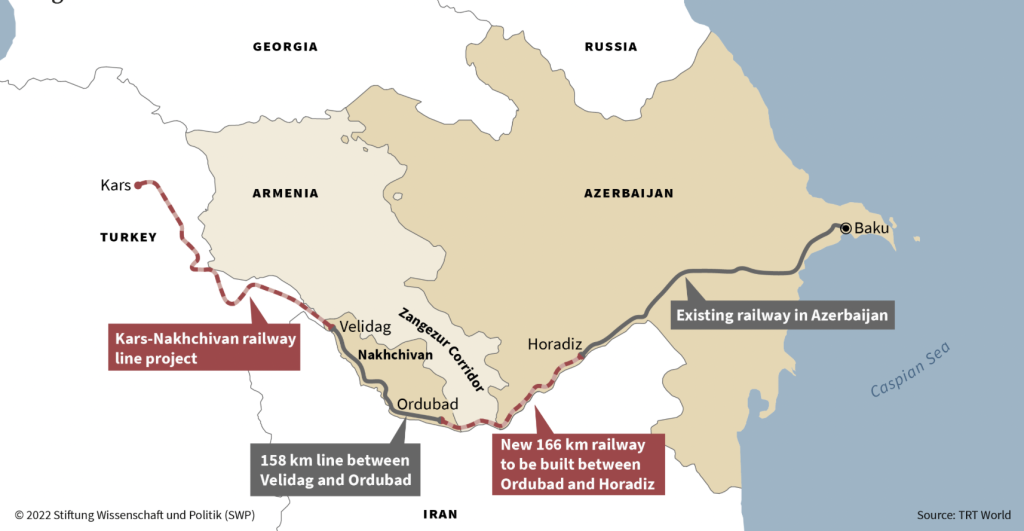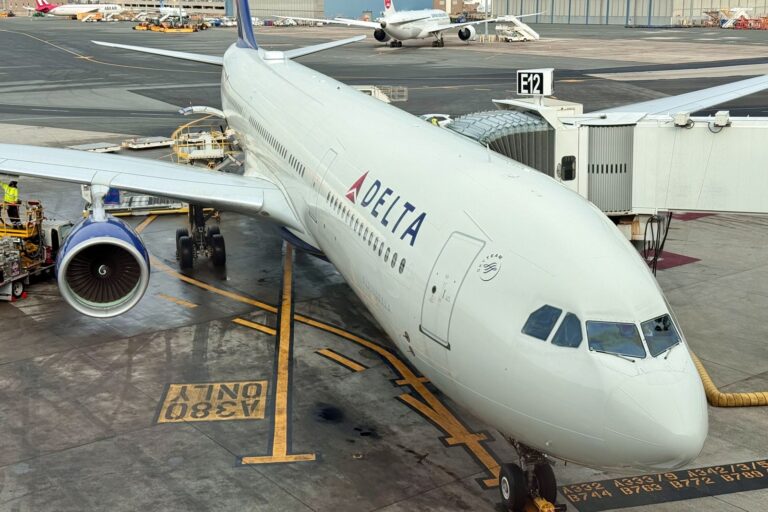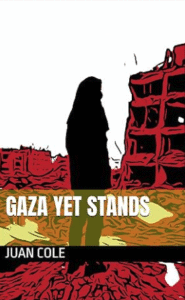The Trump Route for International Peace and Prosperity (TRIPP) is being sold as an infrastructure project which will include rail lines, pipelines, and fibre-optic lines. The US now has exclusive development rights to the corridor cutting across southern Armenia along its border with Iran for 99 years. Progress is slow to non-existent so far, however, as a construction timetable for any of the above infrastructure has yet to be ironed out.

TRIPPing
Some might argue that TRIPP is part of Team Trump’s desire to take on China in the logistics wars. It could be “seen as a peaceful and legitimate competitor to…Chinese initiatives.” But who among the Trump administration (or Biden’s before) and in the State Department is really interested in that—or believes the US is actually still capable of competing on infrastructure building?
Given the US track record is it not more likely that Washington will—intentionally or not—turn the region from a simmer into a raging inferno?
How could it happen? There are plenty of possibilities, including:
- Any one of the players overplaying their hands.
- Destabilization of Armenia. The need for Armenia to alter its constitution in order to complete peace with Azerbaijan is already tearing the country apart.
- Traffic between Russia and Iran through Armenia could be inconvenienced leading to them taking retaliatory measures that quickly escalate.
Put simply, the US involvement is akin to throwing a match in a bale of dry hay.
Following the signing of the TRIPP agreement, we said it was less of an infrastructure and economic deal than a fly in the soup of Russia and China, as well as a wider effort to set events in motion against Iran. The Caucasus is but one facet of the pressure campaign against Tehran, which also includes economic sanctions, the ongoing violence against its allies in the Levant, and in the Persian Gulf.
Breaking 🚨
🇮🇷 Iran has reportedly deployed a significant number of anti-ship missiles on the Persian Gulf islands of Abu Musa, Lesser Tunb, and Greater Tunb.
These islands long disputed with the UAE sit astride one of the world’s busiest maritime https://t.co/yo86PwZyJb is a… pic.twitter.com/Z1kniqNYPh
— Shafiq Khattak (@ShafiqKahttak) October 8, 2025
As plans progress elsewhere, what is taking shape in the Caucasus?
Armenia on the Primrose Path
Protests outside Russia’s military base in Gyumri, Armenia, which houses approximately 4,000 troops are now occurring, and could be another spark should the government request their exit.
This is partially the result of Yerevan’s effort to lay all the blame for the country’s losses to Azerbaijan at the feet of Moscow. While it is not true, it provides an easy scapegoat, and is a narrative supported by the West.
Despite that effort and the usual presence of Western NGOs and their largesse in the country, public opinion on Russia remains mostly favorable, which has likely prevented the government of Prime Minister Nikol Pashinyan—which is far less popular— from torpedoing relations even faster than he has.
While Pashinyan might be methodical with his sledgehammer, the damage is being done. And his actions reveals the contradictions in the government’s plan, as well as the whole TRIPP exercise.
One of the government’s latest inflammatory moves was the arrest of billionaire Russian-Armenian businessman Samvel Karapetian. Branded a “Putin oligarch” by the US Treasury Department, he owns the Tashir Group, which controls the Electric Networks of Armenia (ENA). The government effectively took over ENA following the arrest. What happened next?
Moody’s quickly downgraded the utility’s credit rating, signaling an immediate loss of investor confidence directly linked to the government’s politically motivated actions.
Pashinyan’s government is selling the distant prospect of EU integration while framing any naysayers as pro-Russian agents. Back in February, the Armenian government approved a bill on starting the accession process to the EU, which should they follow through, will ultimately mean crashing out of the Eurasian Economic Union (EEU), which is Armenia’s lifeline. This will prove an unmitigated disaster for Armenia—and that’s if it’s only isolated to the economy and doesn’t go hand in hand with more conflict in the region.
According to Russian Deputy Prime Minister Alexei Overchuk, should Armenia leave the EEU, exports of Armenian goods will shrink by 70-80 per cent while energy and food prices skyrocket.
As Fitch Ratings notes, Armenia’s economy relies significantly on Russia for both trade and energy. For example, Armenia currently pays Russia $165 per thousand cubic meters of gas, well below the market price in Europe, and Russia is Armenia’s number one trading partner.
How can anyone in their right mind look at the path of Ukraine, Moldova, and in the past, Georgia, and decide that is a wise course for the country? The search is on to find such other “incentives” that have led the government to chart this course. There is smoke around Pashinyan with reports that British gambling money is being funneled to Armenia and to the prime minister and his friends as an added incentive to sway them in a geopolitical direction.
There are allegations that funds from the French Development Agency (AFD) and the Coordination Council of Armenian Organisations of France (CCAF) are being used for politicians’ personal benefit, including Pashinyan’s purchase of a three million euro villa near Marseille. The actions of the Pashinyan government would make far more sense in this case, although not any more reassuring for his countrymen.
Azeri Assets?
Is a similar scenario playing out in Azerbaijan?
That looked to be paying massive dividends with Azeri-Russian ties fraying over the past 10 months, but President Putin met with his Azerbaijani counterpart Ilham Aliyev during the recent Commonwealth of Independent States leaders’ summit and apologized for last December’s Azerbaijan Airlines tragedy. His change of tone comes as the US just can’t help itself from threatening more sanctions:
PEACE Act, recently introduced in the US House of Representatives, is said to aim at strengthening peace in the South Caucasus, including through sanctions should Azerbaijan launch new military action against Armenia. Baku, expectedly, sees it differently.https://t.co/MU1dJKO08A
— JAMnews (@JAMnewsCaucasus) October 9, 2025
According to Putin, Russia’s investigation shows that air defense missiles exploded in proximity to the aircraft while responding to Ukrainian drone attacks. He also promised to pay compensation to the victims’ families. This appears to have satisfied Aliyev, and we’re now possibly looking at a Russian-Azeri rapprochement. Quite the deal for Baku, which threw Russia overboard on TRIPP, if it is now welcomed back with open arms. We shall see. There are quite a few hurdles to overcome, and even if Aliyev makes nice with Moscow, there’s still the Iran issue.
Azerbaijan’s two closest international partners are Turkey and Israel, which as we detailed on Monday, remain united for now despite appearances to the contrary on the surface. At the same time Azerbaijan’s economy depends on its oil and gas, which could be left in tatters should it be sucked into any conflict in the region.
Would Aliyev risk that in order to play a larger role (Mossad is already believed to use Azerbaijan as an operating base) in any future conflict with Iran? Two points that could point to yes.
For one, it’s an all-hands-on-deck moment across the West, which means all forms of bribery and pressure are coming to bear on useful states like Azerbaijan. Secondly, it’s instructive to look at Azerbaijan’s recent history and major players in that oil and gas industry. While Russia is a player in the Azerbaijani fossil fuel sector, it’s not as big as BP, the country’s biggest foreign investor, a fact that gives it plenty of influence in Baku.
When Azerbaijan emerged as an independent state from the USSR, BP backed Heydar Aliyev, who was installed as president after a 1993 coup. According to James Marriott, co-author of The Oil Road (2012), an account of the company’s dealings in Azerbaijan, “The important point is how BP helped form a state that would assist in meeting the company’s needs.”
Heydar ruled until his death in 2003 when his son, Ilham, then took power. He still runs the show in Azerbaijan, but also has a foot planted in the UK. From Peter Geoghegan writing at the London Review of Books:
The Pandora Papers leak of offshore documents in 2021 revealed that Aliyev’s children, father-in-law and associates controlled a London property empire worth nearly $700 million through a network of shell companies. Among the holdings were three Knightsbridge apartments and four commercial buildings in Mayfair owned by Aliyev’s son, Heydar Jr, who is expected eventually to succeed his father as president. Between 2012 and 2014, the Azerbaijani regime allegedly funnelled £2.2 billion through UK-registered companies to launder money and pay bribes. Beneficiaries included members of the Council of Europe’s parliamentary assembly. The now defunct European Azerbaijan Society was the second highest-spending foreign lobby group in the House of Commons between 2010 and 2017, taking dozens of MPs on all-expenses-paid trips to Baku.
Meanwhile, Azerbaijan’s relations with its two large neighbors—Russia to the north and Iran to the south—aren’t looking so hot.
Baku recently demolished dozens of Soviet monuments in Nagorno Karabakh, a move not uncommon in former USSR states these days but one usually accompanied by tenser ties with Moscow and a desire to rewrite history. Indeed, in this case the destruction of the monuments is symbolic of the relationship between Azerbaijan and Russia these days. As is the wreckage of Azerbaijani oil and gas infrastructure in Ukraine:
#Russia targeted SOCAR infrastructure in Odessa. Previously, Baku warned that if Russia kept attacking #Azerbaijan|i energy facilities in #Ukraine, it might reconsider the arms embargo on Kiev. However, Russia responded with another heavy attack, sending a clear message to Baku! pic.twitter.com/ca41de9reC
— IWN (@A7_Mirza) August 18, 2025
There are also reports emerging that Azerbaijan is running arms to Ukraine through Africa and that Azeri MiG-29 fighter jets are turning up in Ukraine. Neither will make any difference in the conflict there, but we’ll have to see if such actions continue after the recent Putin-Aliyev meeting.
Lest we forget, the two countries enjoyed a strong relationship not even a year ago. And Azerbaijan’s President Aliyev looked like a wise statesman for how he was playing all sides as the geopolitical chessboard was being overturned. Azerbaijan plays a central logistical role in Eurasian integration projects like the International North-South Transport Corridor from India to Russia and the Middle Corridor from China to Europe. Baku took advantage of the EU gas misadventures by securing lucrative deals to send Azeri gas to the bloc while simultaneously courting Russian involvement in the country’s oil and gas sector—and even importing more Russian gas itself in order to meet domestic demand and its obligations to Europe. It took advantage of its increased leverage with Europe and the US by taking Nagorno-Karabakh (a territory internationally recognized as part of Azerbaijan but populated by Armenians). Baku also managed its oftentimes rocky relationship with Iran despite its oil-for-weapons embrace with Israel. Those latter ties, along with assistance from Turkey, helped Azerbaijan enjoy an overwhelming military advantage against Armenia in recent years.
Aliyev now looks more like an MI6-Mossad asset who has been activated. Beginning with the downing of Azerbaijan Airlines flight J2-8243 (blamed entirely on Russia by Azerbaijan and the West but likely caused by a NATO-Ukraine drone swarm launched against Russian civilian infrastructure at the time the plane was hit) Baku and Moscow have either been hit with a series of escalating unfortunate events or a calculated campaign to poison the well.
If we take another step back, it appears as though the leaders of both Armenia and Azerbaijan, while playing the part of mortal enemies, have been working in tandem to push Russia out and bring in the US-EU.
It was Russia that forced peace on Armenia and Azerbaijan in the 2020 war, sent in peacekeepers, and was party to the trilateral statement that called for a link between Azerbaijan and its Nakhichevan exclave. The agreement also explicitly stated that control over transport communication shall be exercised by the Border Guard Service bodies of the FSS of Russia.
It was not to be. Why?
Murmurs in Armenia that its loss to Azerbaijan in the 2020 war was the result of Russia not adequately coming to the country’s aid became a roar following Azerbaijan’s taking of Nagorno-Karabakh last year.
What that common narrative omits, however, is that it was Armenian Prime Minister Nikol Pashinyan who gave Azerbaijan the keys to the territory. After Pashinyan insisted talks exclude Russia and instead involve the West, Armenia agreed to officially recognize Nagorno-Karabakh as part of Azerbaijan, and Pashinyan came right out and declared so publicly.
Baku then moved to take the territory by force without the Pashinyan government offering even token resistance. Meanwhile, they shout it is all the fault of the Russians. Consequently, they argue Armenia must move closer to the EU and US because Moscow is unreliable.
Yerevan gets what it wants, as does Baku.
Still, it looked as though Azerbaijan was going to honor the 2020 peace deal that called for Russian involvement in what was once referred to in Baku as the Zangezur Corridor. Yet, that too changed with the downing of the Azeri plane on Christmas day. As Baku-Moscow ties deteriorated, Armenia gave Azerbaijan more of what it wanted, and TRIPP was born.
It’s difficult to see it leading to the peace and prosperity in its name. For one, Baku certainly seems likely to be involved in the next conflict with Iran as Azerbaijan operates as a not-so-clandestine forward operating base for Israel:
According to Adib, Israeli jets launched from Azerbaijan, skirted Syrian and Iraqi airspace unchallenged, and covered nearly 1,800 kilometers with the aid of five refueling aircraft.
He tied earlier Israeli covert missions against Iran, including the planned hit on former Hamas…
— Thomas Keith (@iwasnevrhere_) September 18, 2025
Iranian officials continue to insist that Israeli drones launched from Azerbaijan during the 12-Day War (Azerbaijan denies this).
China in the Caucasus
Here’s ThinkChina on how TRIPP affects Beijing:
The new route neatly plugs into the Middle Corridor (the Trans-Caspian International Transport Route, TITR): freight runs from China through Kazakhstan to the Caspian, is ferried to Azerbaijan, traverses the South Caucasus (Baku–Tbilisi–Kars rail) to Turkey, and onward to Europe. The Middle Corridor has been the fastest-growing overland alternative to the northern route via Russia and to longer maritime legs.
Its pronounced growth is impressive: container flows have risen severalfold since 2022 and container volumes on the route reached tens of thousands of TEUs in 2024, with total tonnage in the low millions; multilateral forecasts from the World Bank and OECD say freight could at least triple by 2030 with infrastructure investment. Those projections, however, assume improved transshipment efficiency and regulatory coordination.
…If the corridor operates on purely commercial, non-discriminatory terms, Chinese logistics and industrial firms stand to gain. But if the route becomes securitised or if Washington leverages its control for geopolitical influence, Beijing faces two difficult choices: either accept higher operational costs or navigate a complex balancing act by engaging commercially with corridor operators while deepening political ties with alternative regional players such as Russia, Turkey or Georgia.
Anyone with any cursory knowledge of US foreign policy knows—barring some unexpected sea change—which of those two paths TRIPP is going to take.
Speaking of two paths, as the following map shows, the Middle Corridor from China currently has two routes (TRIPP offers a potential third) once crossing the Caspian and reaching Azerbaijan. Both go through Georgia with one reaching the Black Sea and onto European ports from there while other continues by land through Turkey.

A map of the Trans-Caspian International Transport Route. (Image: Tanvir Anjum Adib/Licensed under CC BY-SA 4.0)
And what do you know, there was just recently an attempt to overthrow the government in Georgia.
Hired Guns in Georgia
If the US-led West has its hooks in Armenia, Azerbaijan, and Turkey, Georgia is still holding out while the EU and US keeps throwing its cavalry at the fortified lines.
Following local elections in Georgia, European officials and ambassadors led by perpetually lost EU foreign affairs commissioner Kaja Kallas attempted to discredit the elections and fan the flames of “protests.”
According to Geogian security services, there was also a plot to overthrow the government. From Top War:
Georgian security forces managed to seize weapons and explosives intended for sabotage during protests in Tbilisi on October 4. According to First Deputy Head of the Security Service Lasha Maghradze, the weapons, ammunition, and explosives were seized in “large quantities,” and traced back to Ukraine. According to the State Security Service, the weapons were planned to be used to seize the presidential palace and overthrow the current government.
If the allegations are true, US-backed Ukraine just tried to overthrow the democratically elected government of Georgia. Again.
We’ve had a few years of these stories now. Last year, Tbilisi began to crack down on returning members of the Georgian Legion — a group of anti-Russian mercenaries fighting in Ukraine — who it says are plotting attempts to overthrow the government in Tbilisi. And before this most recent example, the Georgian state security services recently arrested two Ukrainian citizens on charges of illegally acquiring, storing, and transporting explosives.
At some point there will likely be fireworks. And it offers another reminder that Ukraine, aside from the failed attempt to deliver a strategic defeat against Russia, acts as a terrorism clearinghouse for US. Already helping US-aligned takfiri destabilization forces in Syria, Africa, and elsewhere, there are increasing signs of it popping up in Georgia.
The EU continues to threaten Georgia with the loss of visa-free travel. The government in Georgia continues to say, ‘go ahead, we choose sovereignty over such privileges.’
Meanwhile China has a Free Trade Agreement and Visa Free Regime with Georgia and is one of its top trade partners. Beijing is building ports, highways, and railways, and the West is once again caught in one of its self-fulfilling prophecies. The more it leans on with-us-or-against-us logic, the more it sanctions and cuts foreign investment, and therefore the more countries like Georgia turns to China. That lessens the West’s leverage and makes it more dependent on—and overconfident in—violent regime change operations.










